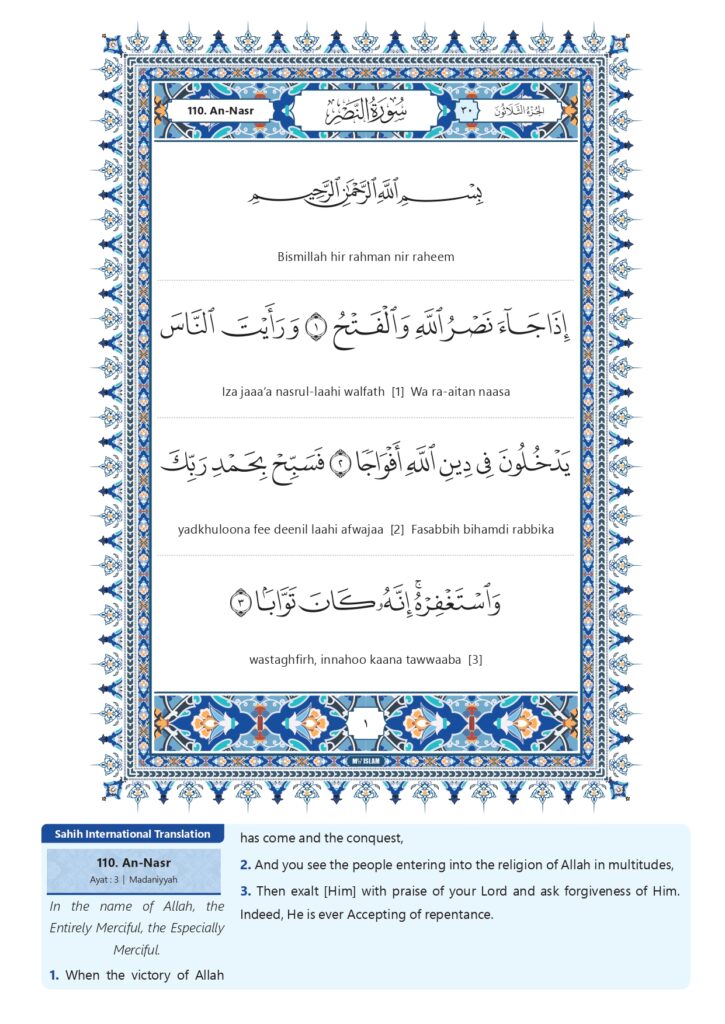Surah An-Nasr Transliteration (سورة النصر) is the 110th chapter of the Quran. It is a short surah Nasr, consisting of just three verses, and it was revealed in Medina. The surah Nasr speaks about the victory granted by Allah to the believers and the ultimate triumph of Islam. It serves as a reminder of Allah’s support and a call to gratitude and worship.
Click here to download the entire Quran from Google Drive for free now.
Surah An-Nasr Transliteration

Transliteration of Surah Nasr text:
A’uthu billahi min ash-shaytan ir-rajim
Bismillahir Rahmanir Rahim
- Iza jaaa nasrullahi wal-fat’h
- Wa ra’aytan-naasa yadkhuloona fee deenillahi afwaja
- Fasabbih bihamdi rabbika wastaghfirhu innahu kana tawwaba
English Translation of Surah Nasr:

In the name of Allah, the Most Compassionate, the Most Merciful
- When the victory of Allah has come and the conquest,
- And you see the people entering into the religion of Allah in multitudes,
- Then exalt [Allah] with praise of your Lord and ask forgiveness of Him. Indeed, He is Ever Accepting of Repentance.

Good job! We’ve finished Surah An-Nasr completely. Now we can start reading Surah Al-Masad.
Surah Al-Masad (111) Transliteration and Translation with Video to Correct Your Recitation
The Significance and Lessons of Surah Nasr
Surah Nasr emphasizes the importance of recognizing Allah’s support and the inevitability of victory for those who believe in Him. It highlights the significance of gratitude and worship following moments of triumph and success.
Surah An-Nasr:
Surah An-Nasr celebrates victory through patience and submission.
Let it remind you that success belongs to those who rely on Allah.

Keep Arabic-OM.com in your heart and your browser always.
Key Lessons from Surah Nasr:
- Divine Support: This surah Nasr reassures believers that Allah’s help will come in times of difficulty, leading to ultimate success.
- Importance of Gratitude: After receiving victory, it is essential to turn to Allah in gratitude and seek His forgiveness, acknowledging that success comes from Him.
- Call to Unity: The surah illustrates the power of unity as people enter the fold of Islam, showcasing the importance of community and shared faith.
al fatiha surah Transliteration Read Surah fatiha online 1
How to Recite Surah Nasr Correctly
To help you recite Surah Nasr with proper pronunciation (Tajweed), watch our video tutorial that guides you through the recitation. This video will assist you in improving your pronunciation and understanding the meaning of each verse.
Transliteration of Surah An-Nasr
surah al nasr in english
- Iza jaa nasru Allahi wal fat
When the victory of Allah has come and the conquest - Wa ra’ayta annasa yadkhuloona fee deen illahi afwaja
And you see the people entering into the religion of Allah in multitudes - Fasabih bihamdi rabbika wastaghfirhu innahu kana tawwaba
So glorify the praises of your Lord and ask for His forgiveness. Indeed, He is ever Accepting of repentance.
Frequently Asked Questions (FAQs) About Surah An-Nasr:
1. What is Surah Nasr about?
Surah Nasr discusses the victory and support granted by Allah to the believers, emphasizing the importance of gratitude and worship after achieving success.
2. Why was Surah An-Nasr revealed?
This surah Nasr was revealed during a time when the Muslim community was witnessing significant victories, particularly during the conquest of Makkah. It serves as a reassurance of Allah’s help and a call to humility and gratitude.
3. What does “An-Nasr” mean?
“An-Nasr” translates to “The Victory.” It symbolizes the triumph of Islam and the support of Allah for the believers.
4. How many verses are in Surah Nasr?
Surah Nasr consists of three verses.
5. What should we do after reading Surah An-Nasr?
After reading this surah, it is important to reflect on Allah’s blessings, express gratitude, and seek forgiveness for any shortcomings.
6. Can Surah Nasr be recited for victory in personal matters?
Yes, reciting Surah An-Nasr can be a source of encouragement and faith during challenging times, reminding believers of Allah’s support in their struggles.
7. How does Surah An-Nasr connect to other chapters of the Quran?
Surah An-Nasr is often recited alongside other surahs that emphasize reliance on Allah, gratitude, and the importance of community in faith, such as Surah Al-Fatiha and Surah Al-Ikhlas.
8. What is the historical context of Surah An-Nasr?
This surah was revealed after the Battle of Hudaybiyyah and before the conquest of Makkah, highlighting the transition towards victory for the Muslim community.
9. Is there any specific time to recite Surah Nasr?
Surah An-Nasr can be recited at any time, especially during prayers or moments of reflection on Allah’s blessings.
10. How can I improve my recitation of Surah Nasr?
To improve your recitation, practice regularly, listen to qualified reciters, and watch video tutorials that demonstrate proper Tajweed rules.
11. What is the meaning of Surah An-Nasr?
Surah An-Nasr is a short surah that speaks about the victory granted by Allah and the multitude of people who embrace Islam. It emphasizes the importance of glorifying Allah and seeking forgiveness.
12. What does the victory of Allah refer to in Surah An-Nasr Transliteration?
The victory of Allah refers to the success and conquest of Makkah, which was a turning point in the history of Islam, symbolizing Allah’s assistance and support for the believers.
13. What lesson can we learn from Surah An-Nasr Transliteration?
The surah teaches us to remain humble in the face of victory, to thank Allah for His blessings, and to seek His forgiveness constantly.
14. How can Surah An-Nasr Transliteration be beneficial in our daily lives?
Reciting Surah An-Nasr Transliteration reminds us of the importance of gratitude, seeking forgiveness, and recognizing Allah’s hand in all aspects of our lives, especially in times of success or triumph.
15. Is there a specific time to recite Surah An-Nasr Transliteration?
Surah An-Nasr Transliteration can be recited at any time, but it is especially beneficial after a success or achievement, as it encourages humility, gratitude, and remembrance of Allah’s mercy.
Conclusion Surah An-Nasr Transliteration
Surah An-Nasr Transliteration serves as a powerful reminder of Allah’s support and the inevitability of victory for believers. It encourages gratitude and worship, reinforcing the idea that success comes from Him alone.
For more Quranic recitations and their meanings, explore Surah Al-Falaq and Surah An-Nas
and Transliteration of Surah Al-Masad
By reflecting on Surah An-Nasr in English, one finds inspiration in the divine promise of victory and success, highlighting the ultimate triumph of faith and the mercy of Allah. It encourages believers to constantly be thankful, seek forgiveness, and place trust in Allah’s plan. The surah provides an example of humility, perseverance, and hope—qualities that guide Muslims in their personal and spiritual journeys. Learning Surah An-Nasr in English Transliteration enhances one’s connection with the deeper meaning of the verses and helps in memorizing the surah with ease. For those beginning their journey, using both Surah Nasr translation and English Transliteration together aids in better understanding and improves pronunciation. Reciting this surah regularly reminds believers of the importance of gratitude, repentance, and unwavering faith.



Pingback: Surah Al-Kafirun Transliteration and Translation with Video to Correct Your Recitation (109) -